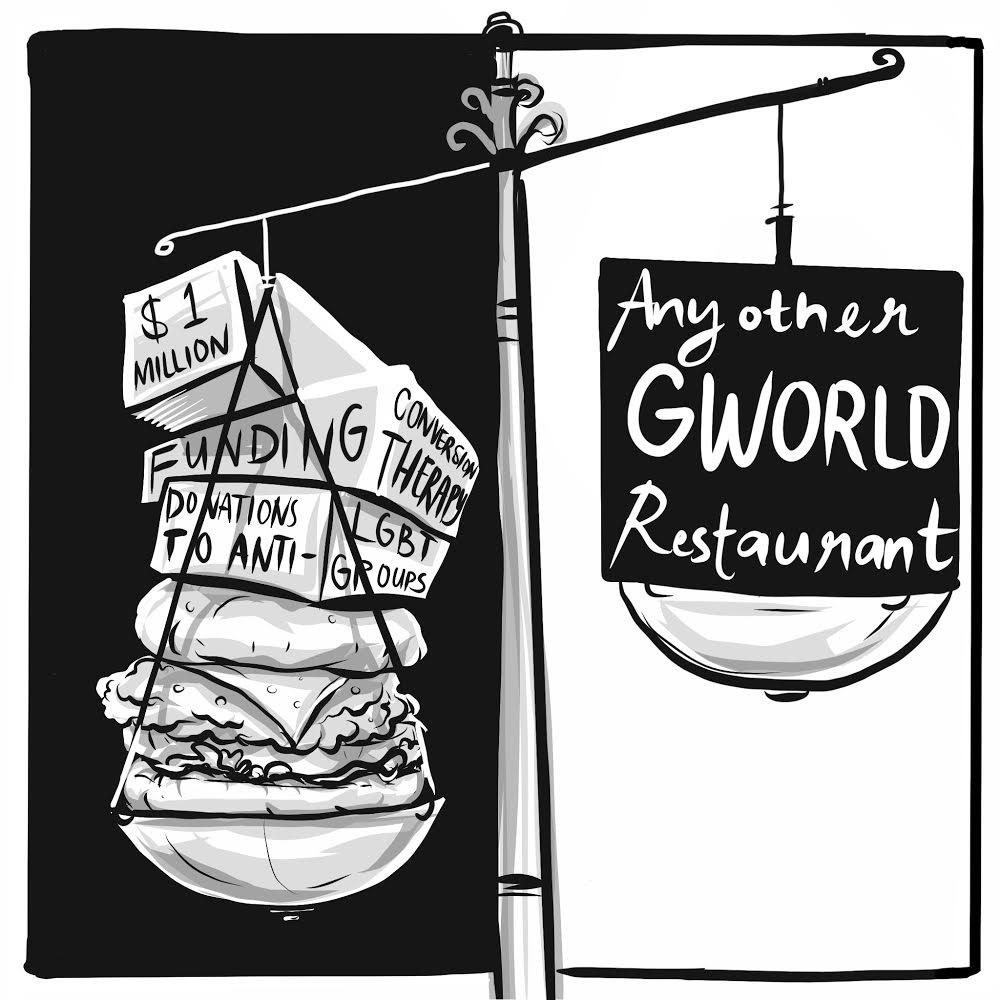Chick-fil-A is a staple on campus. The line of students outside the restaurant’s District House basement location extends dozens of feet beyond where cashiers stand and over to tables where remnants of chicken nuggets and waffle fries are often scattered.
But the line might be shorter if students knew the company has a long-running history of supporting anti-LGBTQ organizations.
Chick-fil-A donated more than $1.8 million to groups with a history of discriminating against LGBTQ individuals in 2017, according to ThinkProgress. But the company has not lost popularity and is on track to become the third largest food chain in America. Chick-fil-A’s meals are affordable and may satisfy students’ fast-food cravings, but students should spend their GWorld dollars elsewhere. The places we spend our money have meaning, and students who disapprove of Chick-fil-A’s bigoted values should stand up and boycott the restaurant on campus.
Chick-fil-A donated more than $6,000 in 2017 to the Paul Anderson Youth Home, an organization that performs conversion therapy – the practice of trying to reorient LGBTQ people. The United Nations has defined the act as “unethical, unscientific and ineffective and, in some instances, tantamount to torture” because reorientation often involves the use of pain and violence. That same year, Chick-fil-A donated more than $1.6 million to the Fellowship of Christian Athletes, an international Christian sports ministry that bans same-sex relationships among employees.

Cartoon by Jekko Syquia
Donations that support the brainwashing of young gay people through conversion therapy are abhorrent. Other donations from Chick-fil-A, like the $150,000 donated in 2017 to The Salvation Army, may not seem problematic on the surface. But The Salvation Army has historically denied shelter to homeless transgender women, one of whom died from exposure to the elements.
Other institutions have condemned Chick-fil-A for its donations. Rider University banned Chick-fil-A from campus and the San Antonio City Council decided not to add the restaurant to the city’s airport last month to “become a champion of equality and inclusion.” Chick-fil-A has maintained that it is welcoming and does not discriminate against any group, but the Chick-fil-A logo is a symbol of homophobia.
The restaurant is a reminder that many people in this country still don’t recognize the humanity of LGBTQ people. Students need to understand that spending their GWorld at Chick-fil-A means they endorse the restaurant’s homophobic beliefs and actions.
As a queer student, the presence and popularity of Chick-fil-A on campus is also a personal slight. That should be enough for students – especially for those who claim to be allies to the LGBTQ community – to stop giving Chick-fil-A their money. When it comes to choosing between Chick-fil-A and any other GWorld vendor, it is a choice between a company that supports homophobic causes or a company that does not.
If you claim to be an ally to the LGBTQ community, you cannot simultaneously give your money to companies that would bankroll torturous conversion therapy of LGBTQ individuals. Being an ally to the LGBTQ community or any minority community means using your power and privilege to denounce acts that threaten these groups.
Understandably, it is difficult to be a fully ethical consumer. A lack of affordability and access can make it difficult to avoid spending money at low-cost vendors like Chick-fil-A. But there are plenty of options available on GWorld for students to satisfy their fast-food cravings.
It can be hard to give up our favorite foods and old habits. I am queer. I have also scarfed down chicken nuggets, fries and a shake from Chick-fil-A in the past. But I recognize the ethical dilemma that comes with enjoying the food. I have the option to not eat at Chick-fil-A, so I don’t. It’s time for students to give up something that does more harm than good.
Jack Murphy, a freshman majoring in philosophy, is a columnist.
Want to respond to this piece? Submit a letter to the editor.


